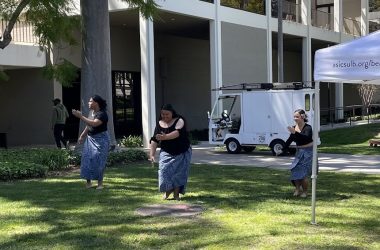Students and professors in California State Universities presented the findings of their research reports at the 32nd Annual Student Research Conference held Saturday in the University Student Union.
The Social Science Research and Instructional Council’s conference included presentations by undergraduates, graduate students and professors. The topics of the presentations ranged from a sociology study on the male virgins to a historical look at laws on the Cherokee Freedmen.
Lori Weber, a Chico State professor and representative at the conference, presented three awards. The awards included the Charles McCall Award for the best undergraduate paper, the Betty Nesvoldf Award for the best graduate paper, and the Gloria Rummels Award for the best paper using quantitative data.
Chris Curd, a junior sociology major, won the Charles McCall Award for the best undergraduate paper. Curd, author of the “Male Virgins: Social Isolation, Religion, and Self-Esteem” report, said he was a little surprised that he won the award.
“Actually, I presented this paper before and I did not win competition, so I wasn’t really going in expecting to be the best one,” Curd said. “But it was definitely satisfying, you know.”
Curd first wrote the report for the Provost Award at CSULB.
“Over the summer, Dr. [Betsy] McEneaney presented me with the opportunity to do some research for the provost award for campus,” Curd said. “I received at $1,500 grant to do research over the summer, and it kind of developed into the fall semester when I worked on the project further with my quantitative research methods class. And it developed into [research paper] that you see here.”
Elizabeth Adle, a psychology graduate student at CSULB, won the Betty Nesvoldf Award for the best graduate paper.
Other CSULB students gave notable presentations as well. Diana Porras, a public policy and administration graduate student, presented a study called “The Cherokee Freedmen,” which analyzed the laws surrounding slaves of the Cherokee nation in America.
“On March 3, 2007, the Cherokee nation had its election where two primary items were on the ballot,” Porras said. “One was to no longer require federal approval of their constitutional amendments and the second was to establish new membership requirements. And what [the Cherokee nation] wanted to do was to require members to trace their lineage to what was referred to as the Dawes Commission Indians article. Both measures were passed, and that in turn disenfranchised about 2,800 Cherokee Freedmen.
“Because of this 2007 vote, they became ineligible for health care, education services, tribal chambers and were ineligible to participate in any tribal elections.”
According to Porras, Cherokee Freedmen were former slaves for the Cherokee nation. The Cherokees signed to the Confederacy during the Civil War, but when their chief was captured, the new chief signed the Cherokee nation with the Union and the slaves were emancipated. In 1866, the Cherokee signed a formal treaty with the United States abolishing slavery on the Cherokee reservations forever and that the slaves receive the same benefits as the Cherokee people. However, the Cherokee people and the Freedmen had many legal disputes over territory.
The United States established the Dawes commission, which created rules for full-blooded and mixed-blooded Cherokee over territory, but this raised even more disputes over the membership policy surrounding the Cherokee Freedmen.
Undergraduates also gave presentations as well. Sarah Spohn, a junior human development major, was one of the undergraduates who gave a presentation. Her report, titled “A Daughter Without Her Father: The Emotional Effects of Losing a Father,” was a study on the extent to which fathers’ impact the emotional well-being of their daughters.
“Those with a strong father figure, I expected them to excel in social relationships, to experience overall lack of anxiety and depression and to have a very stable mental well-being. And I called that whole line together as emotional confidence.” Spohn said. “Conversely, those who had once had a strong father figure in their lives but lost them will basically be the opposite of that. [They] will experience more anxiety and depression, will most likely develop issues with stress and have a lack of emotional well-being or a lack of emotional confidence.”
She conducted two measures of well-being: a survey on overall happiness with a five-point scale ranging from very true to very false, and a survey asking open-ended questions on daughters’ relationships with their fathers.
“As you can see, [I found those] without active fathers reporting more depression and anxiety. They reported being overly afraid of loved ones leaving their mother and them,” Spohn said. “It’s my feeling that all of them reported all this because they had lost their father. They had that strong emotional attachment to their father and it was quickly taken away.”



